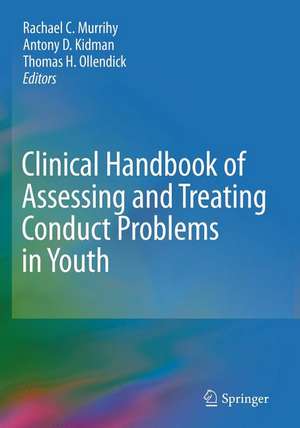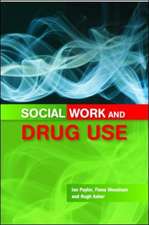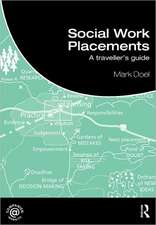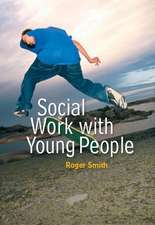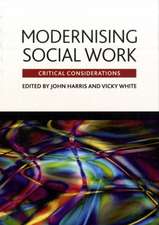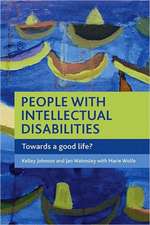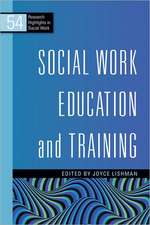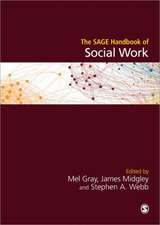Clinical Handbook of Assessing and Treating Conduct Problems in Youth
Editat de Rachael C. Murrihy, Antony D. Kidman, Thomas H. Ollendicken Limba Engleză Paperback – 17 oct 2012
Clinical Handbook of Assessing and Treating Conduct Problems in Youth provides readers with both a solid grounding in theory and a comprehensive examination of the evidence-based assessment strategies and therapeutic practices that can be used to treat a highly diverse population with a wide range of conduct problems. It provides professional readers with an array of evidence-based interventions, both universal and targeted, that can be implemented to improve behavioral and social outcomes in children and adolescents.
This expertly written resource:
- Lays the foundation for understanding conduct problems in youth, including epidemiology, etiology, and biological, familial, and contextual risk factors.
- Details the assessment process, with in-depth attention to tools, strategies, and differential diagnosis.
- Reviews nine major treatment protocols, including Parent-Child Interaction Therapy (PCIT), multisystemic therapy (MST) for adolescents, school-based group approaches, residential treatment, and pharmacotherapy.
- Critiques the current generation of prevention programs for at-risk youth.
- Explores salient issues in working effectively with minority youth.
- Offers methods for evaluating intervention programs, starting with cost analysis.
| Toate formatele și edițiile | Preț | Express |
|---|---|---|
| Paperback (1) | 491.34 lei 6-8 săpt. | |
| Springer – 17 oct 2012 | 491.34 lei 6-8 săpt. | |
| Hardback (1) | 662.92 lei 6-8 săpt. | |
| Springer – 30 sep 2010 | 662.92 lei 6-8 săpt. |
Preț: 491.34 lei
Preț vechi: 578.05 lei
-15% Nou
Puncte Express: 737
Preț estimativ în valută:
94.02€ • 100.54$ • 78.39£
94.02€ • 100.54$ • 78.39£
Carte tipărită la comandă
Livrare economică 17 aprilie-01 mai
Preluare comenzi: 021 569.72.76
Specificații
ISBN-13: 9781441962966
ISBN-10: 1441962964
Pagini: 570
Ilustrații: XXIV, 544 p.
Dimensiuni: 178 x 254 x 32 mm
Greutate: 0.98 kg
Ediția:2010
Editura: Springer
Colecția Springer
Locul publicării:New York, NY, United States
ISBN-10: 1441962964
Pagini: 570
Ilustrații: XXIV, 544 p.
Dimensiuni: 178 x 254 x 32 mm
Greutate: 0.98 kg
Ediția:2010
Editura: Springer
Colecția Springer
Locul publicării:New York, NY, United States
Public țintă
Professional/practitionerCuprins
PART I: AN INTRODUCTION TO OPPOSITIONAL DEFIANT DISORDER AND CONDUCT DISORDER: CLASSIFICATION, EPIDEMIOLOGY AND ETIOLOGY.- Phenomenology of Oppositional Defiant Disorder and Conduct Disorder.- Conduct problems in youth: A sociological perspective.- Etiology of ODD and CD: Biological, familial and environmental risk factors identified in the development of disruptive behaviour disorders.- Integrating etiological factors in ODD and CD: A transactional model.- Devising a treatment plan: Assessment, differential diagnosis and functional analysis for treatment formulation.- PART II: EVIDENCE-BASED TREATMENTS OF CONDUCT PROBLEMS: AN APPLIED APPROACH FOR PRACTITIONERS.- An Overview of evidence-based treatment for preschoolers, children, and adolescents with ODD and CD (indicated interventions).- Parent Child Interaction Therapy for preschool children with conduct problems.- Parent Management Programs for Children.- Cognitive behaviour therapy for the group-based treatment of oppositional youth.- Functional family therapy.- Multisystemic Therapy for the treatment of behaviorally disturbed adolescents.- Aggression management programs for youth in alternative school settings.- Residential and hospital treatment centers for children and adolescents with conduct problems.- Alternative treatments for conduct problems: Wilderness and boot camps.- Pharmacology for children and adolescents with ODD and CD.- Case Studies.- PART III: LOOKING FORWARD: PREVENTION PROGRAMS AND ADVANCED TREATMENT CONSIDERATIONS.- Prevention: Early intervention programs for universal and selected populations.- Treating children and adolescents with disruptive behavior disorders from ethnically diverse backgrounds.- Evidence-based treatment programs for conduct problems: Are they cost effective?.- Epilogue: Future directions in research and practice for disruptive behavior disorders.
Recenzii
From the reviews:
"Overall, the combination of the traditional subjects, updated and enriched by clinically vivid portraits of the topics, with a healthy infusion of fresh, innovative material, makes this book for now the preferred reference on this topic for practicing clinical psychologists."
Joseph C. Blader
PsycCRITIQUES, July 6, 2011, Vol. 56, Release 27, Article 9
“This book provides a comprehensive overview of what is currently known about child and adolescent behaviour problems. … it’s an easy-to-read resource for both researchers and clinicians who wish to develop a solid theoretical understanding of these problems. It also details practical, evidence-based assessment and intervention options that can be applied across a range of settings and is tailored to meet individual needs, such as parent management strategies, family therapy and cognitive behaviour therapy.” (Danielle Ellis, UTS News Room, November, 2012)
"Overall, the combination of the traditional subjects, updated and enriched by clinically vivid portraits of the topics, with a healthy infusion of fresh, innovative material, makes this book for now the preferred reference on this topic for practicing clinical psychologists."
Joseph C. Blader
PsycCRITIQUES, July 6, 2011, Vol. 56, Release 27, Article 9
“This book provides a comprehensive overview of what is currently known about child and adolescent behaviour problems. … it’s an easy-to-read resource for both researchers and clinicians who wish to develop a solid theoretical understanding of these problems. It also details practical, evidence-based assessment and intervention options that can be applied across a range of settings and is tailored to meet individual needs, such as parent management strategies, family therapy and cognitive behaviour therapy.” (Danielle Ellis, UTS News Room, November, 2012)
Notă biografică
Rachael C. Murrihy, PsyD. Dr. Murrihy is currently Senior Clinical Psychologist and Research Associate at the Health Psychology Unit, an adolescent-focused unit, at the University of Technology, Sydney, Australia. Dr Murrihy’s specialty is in the area of clinical adolescent psychology. She has extensive experience lecturing, training, and supervising professionals in this field, including clinical psychologists, psychiatrists, family physicians, nurses, educators, and interns. She also provides mental health lectures for members of the general public. As a practicing clinician, Dr Murrihy works with youth experiencing both internalizing and externalizing disorders across a diverse range of settings, including the university clinic, private practice, inpatient wards, and in mainstream and alternative schools. She has published research on adolescent mental health and has presented this work at conferences, both nationally and internationally. She has held research grants from the Australian Psychological Society, New South Wales (NSW) Department of Health, and the NSW Department of Education and Training. Her research and clinical interests include the assessment and treatment of youth with conduct problems, callous-unemotional traits in youth, cyber bullying and indirect bullying, and Cognitive Behavioral Therapy for early psychosis.
Antony D. Kidman, PhD. Dr. Kidman is a Clinical Psychologist and Director of the Health Psychology Unit of the University of Technology, Sydney, Australia. He has more than 140 scholarly publications to his name including seven books: Tactics for Change; Managing Love and Hate; Family Life, Adapting to Change; Feeling Better, a Guide to Mood Management; From Thought to Action; Stress, Coping and Social Support in the Age of Anxiety, and Schizophrenia, a Guide for Families. Dr Kidman was a member of the National Executive of the Australian college of clinical psychologists for 10 years and was the founderand inaugural Editor for 6 years of the College’s journal, The Clinical Psychologist. He is a Member of the Clinical College of the Australian Psychological Society, an Associate Fellow of the Albert Ellis Institute of Rational Emotive Therapy (NY) and a Fellow of the International Academy of Cognitive Therapy. He has held research grants from the Australian National Health and Medical Research Council and the New South Wales Department of Health. Dr Kidman has had a long-term clinical and research interest in adolescent mental health including anxiety, depression and psychosis. He is a frequent guest speaker on radio and television and writes for the media on mental health. He was made a Member of the Order of Australia in 2005 for his contributions to clinical psychology.
Thomas H. Ollendick, PhD. Dr. Ollendick is University Distinguished Professor in Clinical Psychology and Director of the Child Study Center at Virginia Polytechnic Institute and State University, Blacksburg, Virginia, USA. He is the author of several research articles, book chapters, and books. His books include Clinical Behavior Therapy with Children (Plenum Press), Child Behavioral Assessment: Principles and Procedures (Pergamon Press), Handbook of Child Psychopathology (Plenum Press), Developmental Issues in the Clinical Treatment of Children (Allyn and Bacon) (Oxford), and the Handbook of Interventions that Work with Children and Adolescents (Wiley). He is the past Editor of the Journal of Clinical Child Psychology, past Associate Editor of the Journal of Consulting and Clinical Psychology, current Editor of Behavior Therapy, and founding Co-Editor of Clinical Child and Family Psychology Review. In addition, he is Past-President of the Association for the Advancement of Behavior Therapy (1995), the Society of Clinical Psychology (1999), the Society of Clinical Child and Adolescent Psychology (2003), and is currently President of the Society for the Science of ClinicalPsychology. A frequent speaker at national and international conferences, he is the recipient of several NIH grants. His clinical and research interests range from the study of diverse forms of child psychopathology to the assessment, treatment, and prevention of these child disorders from a social learning/social cognitive theory perspective.
Antony D. Kidman, PhD. Dr. Kidman is a Clinical Psychologist and Director of the Health Psychology Unit of the University of Technology, Sydney, Australia. He has more than 140 scholarly publications to his name including seven books: Tactics for Change; Managing Love and Hate; Family Life, Adapting to Change; Feeling Better, a Guide to Mood Management; From Thought to Action; Stress, Coping and Social Support in the Age of Anxiety, and Schizophrenia, a Guide for Families. Dr Kidman was a member of the National Executive of the Australian college of clinical psychologists for 10 years and was the founderand inaugural Editor for 6 years of the College’s journal, The Clinical Psychologist. He is a Member of the Clinical College of the Australian Psychological Society, an Associate Fellow of the Albert Ellis Institute of Rational Emotive Therapy (NY) and a Fellow of the International Academy of Cognitive Therapy. He has held research grants from the Australian National Health and Medical Research Council and the New South Wales Department of Health. Dr Kidman has had a long-term clinical and research interest in adolescent mental health including anxiety, depression and psychosis. He is a frequent guest speaker on radio and television and writes for the media on mental health. He was made a Member of the Order of Australia in 2005 for his contributions to clinical psychology.
Thomas H. Ollendick, PhD. Dr. Ollendick is University Distinguished Professor in Clinical Psychology and Director of the Child Study Center at Virginia Polytechnic Institute and State University, Blacksburg, Virginia, USA. He is the author of several research articles, book chapters, and books. His books include Clinical Behavior Therapy with Children (Plenum Press), Child Behavioral Assessment: Principles and Procedures (Pergamon Press), Handbook of Child Psychopathology (Plenum Press), Developmental Issues in the Clinical Treatment of Children (Allyn and Bacon) (Oxford), and the Handbook of Interventions that Work with Children and Adolescents (Wiley). He is the past Editor of the Journal of Clinical Child Psychology, past Associate Editor of the Journal of Consulting and Clinical Psychology, current Editor of Behavior Therapy, and founding Co-Editor of Clinical Child and Family Psychology Review. In addition, he is Past-President of the Association for the Advancement of Behavior Therapy (1995), the Society of Clinical Psychology (1999), the Society of Clinical Child and Adolescent Psychology (2003), and is currently President of the Society for the Science of ClinicalPsychology. A frequent speaker at national and international conferences, he is the recipient of several NIH grants. His clinical and research interests range from the study of diverse forms of child psychopathology to the assessment, treatment, and prevention of these child disorders from a social learning/social cognitive theory perspective.
Textul de pe ultima copertă
Conduct problems, particularly oppositional defiant disorder (ODD) and conduct disorder (CD), are the most common mental health problems affecting children and adolescents. The consequences to individuals, families, and schools may be severe and long-lasting. To ameliorate negative outcomes and ensure the most effective treatment for aggressive and antisocial youth, early diagnosis and evidence-based interventions are essential.
Clinical Handbook of Assessing and Treating Conduct Problems in Youth provides readers with both a solid grounding in theory and a comprehensive examination of the evidence-based assessment strategies and therapeutic practices that can be used to treat a highly diverse population with a wide range of conduct problems. It provides professional readers with an array of evidence-based interventions, both universal and targeted, that can be implemented to improve behavioral and social outcomes in children and adolescents.
This expertly written resource:
Clinical Handbook of Assessing and Treating Conduct Problems in Youth provides readers with both a solid grounding in theory and a comprehensive examination of the evidence-based assessment strategies and therapeutic practices that can be used to treat a highly diverse population with a wide range of conduct problems. It provides professional readers with an array of evidence-based interventions, both universal and targeted, that can be implemented to improve behavioral and social outcomes in children and adolescents.
This expertly written resource:
- Lays the foundation for understanding conduct problems in youth, including epidemiology, etiology, and biological, familial, and contextual risk factors.
- Details the assessment process, with in-depth attention to tools, strategies, and differential diagnosis.
- Reviews nine major treatment protocols, including Parent-Child Interaction Therapy (PCIT), multisystemic therapy (MST) for adolescents, school-based group approaches, residential treatment, and pharmacotherapy.
- Critiques the current generation of prevention programs for at-risk youth.
- Explores salient issues in working effectively with minority youth.
- Offers methods for evaluating intervention programs, starting with cost analysis.
Caracteristici
Provides an all-inclusive, comprehensive balance of theory and applied practice, unlike most books on the market that tend to focus on either theory or application, but not both Fifty percent of the overall content comprises therapeutic guidelines for evidence-based treatment Offers comprehensive coverage of assessment techniques Provides numerous case studies that detail the use of treatment Includes supplementary material: sn.pub/extras
